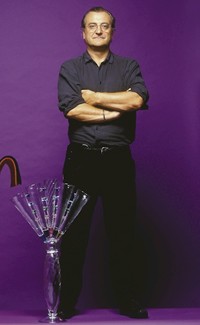
Sixty-year-old Bořek Šípek believes in experiment, playfulness, and humor
 |
People commonly perceive him more as a glass artist and designer of vases, porcelain, and other artifacts offered by his famous Prague salon. However, Šípek is a man of many interests and professions. He taught at the Academy of Art, Architecture, and Design in Prague, for 12 years at a university in Vienna, and is now a professor and dean of the Faculty of Art and Architecture at the Technical University in Liberec. He is also the owner of a restaurant and a co-founder of the Ajeto glassworks.
Above all, he is an architect. A Prague native, he studied furniture design at the Secondary School of Applied Arts, but after emigrating to Germany in 1968, he finally completed his dream of studying architecture in Hamburg. He then studied philosophy, which greatly influenced his architectural thinking.
"I like a direct emotional impact, which is easier to capture on a larger scale," Šípek described what he is drawn to in architecture. He was just over 30 years old when he first gained fame with the glass house in Hamburg, which he designed for his sister. However, he found much more suitable ground for his ideas in the Netherlands, where he opened an architectural and design studio in 1983.
Šípek is said to have invented a Neo-Baroque style. "I am not interested in Baroque shapes, but rather a 'Baroque' approach to the world," he stated. According to him, it involves a lot of bombast and emotion. He prefers to refer to his style as "fusion" - it involves mixing styles, a certain playfulness, and humor. He believes in the avant-garde and experimentation. "I don’t want to do what is currently trending, but what will be trendy in the future," he once declared. This also applies to his design work and glass.
Among Šípek's well-known projects are, among others, the Ginza department store in Tokyo, the Museum of Modern Art in the Dutch town of Den Bosch, and the Škoda car pavilion in Wolfsburg, Germany. In Prague, he designed the Art Center Arzenal, the footbridge over Chotková Street, and most recently, the residential Palace Ehrlich for Plzeň.
"I am not ashamed of anything I have created so far," Šípek claimed, who became famous primarily in the honorary role of chief architect of Prague Castle during the presidency of Václav Havel. The castle was a challenge for him and also an enrichment for confronting history. Next to the legendary Havel's office, he left behind, for example, the renovated castle picture gallery or a successful entrance to the presidential office. He became good friends with Havel, for whom he reconstructed and "Šípekized" the villa in Střešovice.
Since the 1980s, Šípek gained prominence as a designer primarily through his work for the world design icon Italian Driade. He still works for them today, but he also creates for other significant companies such as Wittmann, Swarovski, Leitner, and Quartet in Austria, Swiss Vitra, and Sévres and Saint-Gobain in France. He has also designed commercially successful collections for the legendary brand Rosenthal.
After returning to the Czech Republic in 1989, he co-founded a new glassworks Ajeto in Lindava in Českolipsko with glassblowers Petr Novotný and Libor Fafala, which is now known abroad as well. He sets its artistic profile and also has the best facilities for his designs there.
In Prague, he runs the Arzenal restaurant, which combines a design salon with Thai cuisine. In addition to the culinary experience, guests can purchase glasses, cutlery, or plates they have eaten from, as well as tables, chairs, and other accessories. A lover of Asia, he has combined Thailand, where he loves to stay, with his passion - cooking. The kitchen is for him a space full of creativity, and food an artistic creation. He enjoys cooking and does it well; for him, it is also a form of meditation.
He tries to protect his privacy, but he is famous and lives with pop singer Leona Machálková, with whom he has a six-year-old son, Artur. Both often attract tabloid attention, partly because the well-known architect only finalized his divorce this year from Dutch choreographer Hillary Uden, the mother of his sons Milan and Dalibor.
Šípek does not surround himself with his creations. On the contrary, he needs a "clean table" for new ideas. While he has no far-reaching plans, he would still like to demonstrate that "he can be completely original" in something.
The English translation is powered by AI tool. Switch to Czech to view the original text source.
0 comments
add comment
Related articles
37
13.02.2016 | Šípkovo úmrtí je podle osobností ztrátou pro českou kulturu
0
13.02.2016 | The artist, architect, and educator Bořek Šípek has passed away; he was 66 years old
19
05.12.2014 | In the center of Liberec, a unique building by Bořek Šípek has been created
7
10.12.2008 | In Pilsen, 52 luxury apartments are being created in the Ehrlich Palace
10
11.03.2008 | Liberec University will launch a new program focused on design
0
19.03.2006 | <span>Šípek is exhibiting in Assen, the exhibition was opened by Havel and Kok</span>
0
16.11.2005 | Architect and designer Bořek Šípek awarded in Paris






